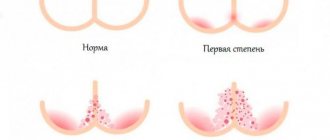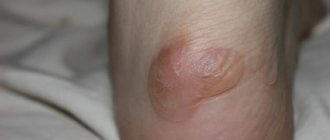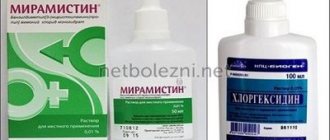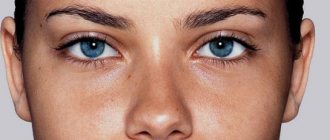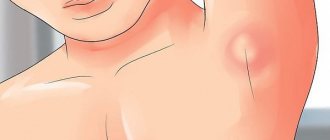Herpes on the pubis appears as a result of infection with the corresponding virus.
There are types 1 and 2 of herpes simplex.
Herpetic lesions on the pubis are usually caused by the second type.
The source of infection is a virus carrier or a person with herpes.
It is transmitted sexually.
There are also other methods of transmission.
Infection is possible through close household contact.
However, if the elements of the rash are located predominantly on the pubis, infection most likely occurred during sexual intercourse.
Genital herpes on the pubis
Initially, the herpes virus, penetrating the body, begins to multiply exactly where it penetrated the skin.
Bubbles form there.
These are vesicles - morphological elements that are small cavities with clear liquid.
The virus subsequently enters the circulatory system.
It invades nerve endings and ganglia.
The herpes virus will persist for life in autonomic nerve cells and can cause exacerbations.
It leads to a decrease in immunity, as it affects immunocompetent cells.
If herpes is localized on the pubis and genitals, then the main reservoir of the virus is the ganglia of the lumbosacral spine.
The infection can have a different clinical course.
Sometimes a person who has had genital herpes never suffers from it again.
But in 40% of cases recurrent herpes develops.
It can occur at any age.
Pubic herpes may appear again after a few months or years.
The causes are provoking factors:
- insolation (tanning)
- hypothermia
- injury
- serious disease
- drinking alcohol
- hormonal disorders
Most often, recurrent herpes develops as a local process.
That is, rashes appear on the pubis again and again.
But the rash does not spread to other parts of the body.
Sometimes genital herpes becomes generalized.
It can affect different areas of the skin, organs, including the brain.
Symptoms of lichen in the groin
Fungal infections can be found on different parts of the body: head, arms, legs, mouth, abdomen, as well as nail plates, feet, and groin area. The main symptoms of the disease are:
- Flaky areas of the epidermis.
- Unpleasant sensations: itching and burning.
- A large accumulation of small rash with cloudy liquid.
The area of localization of fungal infections in the male half is located on the surface of the thighs and lower abdomen, folds of the buttocks, anus and scrotum. In women, lichen can be found in the armpits, under the breasts, between the fingers, and also on the pubic area; thanks to the photo, the disease can be identified at the initial stage.
The first signal of the presence of lichen is the appearance of pink spots. Their characteristic feature is the presence of an inflammatory process and a gradual increase in size. After a certain time, the inflammation in the central part of the rash goes away, while it remains at the edges. If the spots are constantly scratched, the wound may become infected and then suppurate.
Find out more
What does pubic herpes look like?
Classic herpes consists of blisters with liquid on the skin.
They often appear not only on the pubis, but also on other areas of the skin and mucous membranes.
Vesicles are formed in groups.
They are located asymmetrically.
Appear on hyperemic skin.
The vesicles resolve spontaneously after an average of 3 days.
In their place, either erosions or ulcers form.
More often these are erosions, and they are more favorable.
Because ulcers leave behind scars, because they are associated with damage to the deeper layers of the skin.
Main patient complaints:
- burning sensation on the pubis
- pain
- edema
- enlarged lymph nodes
Ringworm on the labia
Not only men, but also women are susceptible to shingles; in the latter, painful spots appear on the labia and perineum, and a photo will help identify the disease, but patients cannot do without qualified medical care. Intolerable itching and burning occur in the genital area, which means the onset of an inflammatory process.
In advanced stages, the light affected areas will darken and blisters with suppuration will appear on them. In addition, in the fair sex, the disease will spread to other parts of the body, including the legs and anus. In the absence of proper treatment, lichen will lead to disruptions in the functioning of the entire body.
Local and general symptoms of herpes on the pubis
After the initial infection, as well as with each relapse, rashes appear on the pubic area.
Herpes also gives general symptoms.
They are as follows:
- hyperthermia
- weakness
- enlarged lymph nodes
- their soreness
This condition occurs with general viremia.
That is, it is caused by the herpes virus entering the circulatory and lymphatic system.
This occurs when the human immune system is unable to localize the process.
Herpes on the pubis can be primary or recurrent.
Primary is the one that arose for the first time.
It is caused by a fresh infection from another person (sexual partner).
Recurrent is a form of the disease that develops as a result of activation of herpes.
The virus remains latent for a long time.
Then it “wakes up” and causes an exacerbation with the re-formation of a rash on the pubis.
Recurrence of herpes occurs without previous sexual contact with the source of infection.
Since the virus is already in the patient’s body.
Based on the symptoms, genital herpes can be:
- typical
- atypical
- asymptomatic
After infection, two scenarios are possible.
The first is that the person does not feel symptoms.
He becomes a carrier of the virus, but is unaware of it.
Second, a stormy clinical picture arises.
Herpes is much more severe than subsequent relapses, if any.
The shorter the incubation period, the stronger the symptoms.
Its duration is up to 10 days.
Sometimes the incubation period lasts only 2-3 days.
Then an acute herpetic infection can last up to 1 month or more.
The typical form of genital herpes is characterized by:
- formation of erythema (red spots)
- the appearance of vesicles
- their resolution with the formation of erosions
- epithelialization
With recurrent herpes, subjective sensations appear a day or two before the next relapse.
The patient suffers from itching of the pubic skin, pain, and the skin may turn red.
Sometimes general symptoms such as fever and malaise appear.
Lymph nodes may enlarge before the rash appears.
Causes of lichen in the groin
This disease is caused by spores of pathogenic fungi, and their rapid reproduction occurs in a damp, warm environment. The accumulation of pathogenic microorganisms occurs mainly in the folds in the armpits and groin. In advanced conditions, characteristic symptoms occur between the fingers on the extremities.
Men are much more susceptible to this dermatological disease than women. Infection occurs in public places through personal hygiene items, as well as through direct contact with a sick person. Pathology occurs when there is intimacy with a partner infected with lichen.
First of all, infection occurs due to a weak immune system, obesity, serious illnesses, a stressful situation, as well as excessive work of the sebaceous glands. If you do not follow the rules of personal hygiene, wearing clothes made of low-quality materials can also contribute to the development of lichen.
Pathogenic fungi are characterized by microscopic size and a high degree of survival. Under comfortable conditions, it can live for several days. When infected, it adapts to the groin and rapidly begins to multiply, causing pain to the sick person. In the groin area, body temperature is always higher, so this part of the body is most often affected by fungi.
Enlarged lymph nodes due to herpes pubis
With herpes, the inguinal lymph nodes increase in size.
This occurs after the initial infection.
And also whenever the infection recurs.
Enlarged lymph nodes are often unilateral.
They may be painful when palpated.
Swelling of the skin and redness over the lymph nodes and blood vessels are often noted.
Atypical forms of herpes on the pubis
It is much more difficult to diagnose herpes on the pubis if there is an atypical form of the disease.
Atypical is a form in which:
- the cycle of formation of morphological elements changes
- non-standard location of lesions
- subjective sensations prevail over objective symptoms of herpetic infection
Abortive form - characterized by rapid regression of rashes immediately after their appearance.
It often occurs in patients who receive antiherpetic therapy in a timely manner.
The next exacerbation is usually preceded by a prodromal period.
Over time, patients learn to recognize it.
As soon as the condition worsens, the body temperature rises, the pubis itches, they take medications.
As a result, a classic exacerbation does not develop.
The rash may present as:
- papules
- red spot on swollen skin
- microerosions
Quite quickly the skin clears up and the exacerbation passes without really starting.
Edema form - there are no rashes, but only hyperemia and swelling.
Itchy form - the leading symptom is itching.
In the hemorrhagic form, blisters containing blood rather than clear liquid appear.
In the subclinical form, there are no rashes, but only cracks in the skin.
Diagnostics
Only a doctor can diagnose the disease and prescribe treatment. Therefore, after rash spots and discomfort appear in the groin area, a visit to a dermatovenerologist is necessary.
If the first signs of lichen occur, immediately go to a dermatologist; the later you see a doctor, the more complications there will be.
The doctor will collect anamnesis, examine the patient and study the nature of the rash. After making the initial diagnosis, the following tests are prescribed:
- biochemical and general blood tests, general urinalysis;
- the presence of diseases such as syphilis is excluded - microscopy of scales is performed;
- a biopsy of pieces of affected skin from the groin is prescribed - some types of lichen have similar symptoms and areas of spread;
- DNA of the virus is detected in the contents of blood and vesicles;
- the presence of antibodies to the pathogen is determined;
- Tinea versicolor is checked using the Balzer test - iodine is dripped onto the affected areas, immediately wiped with alcohol, and the spot turns brown;
- examination of spots in the groin using a Wood's lamp: pityriasis versicolor appears as a yellow glow, ringworm turns green.
Only after examining and diagnosing the disease, the doctor prescribes appropriate treatment.
Pubic herpes and pregnancy
Herpes is dangerous during pregnancy.
Although external manifestations may be localized only on the pubis, in fact, pathological processes also affect the internal reproductive organs.
According to some studies, herpes provokes up to 30% of all cases of spontaneous abortions in the early stages of gestation.
This is the cause of half of late miscarriages.
In terms of the degree of negative impact on the fetus, herpes ranks second after rubella.
In addition, a mother can infect her child with this virus.
Infection occurs both in utero and during childbirth.
Any relapse of herpetic infection in pregnant women is subject to treatment.
If herpes occurs on the pubis before 34 weeks, drug prevention is indicated.
It is necessary to prevent the child from becoming infected.
Acyclovir is prescribed in the last 4 weeks before birth.
If infection or exacerbation occurs after 34 weeks, this is an indication for cesarean section.
Prevention
To prevent groin fungal disease from recurring, it is important to monitor your health and maintain your immunity at a sufficient level. To do this, you need to eat right, eliminate bad habits, and lead a healthy lifestyle. To prevent the fungus from multiplying in the groin folds, it is important to monitor your hygiene so that these places are dry and clean at all times. Therefore, it is necessary to regularly take a refreshing shower, wear comfortable underwear made from natural fabrics, have personal hygiene items and not share them with anyone. When the first symptoms occur, it is better to immediately consult a dermatologist. Only a doctor can select adequate treatment to prevent the development of relapses.
Complications of herpes on the pubis
Herpes in most cases has a mild or moderate clinical course.
But sometimes seemingly harmless pubic rashes ultimately lead to serious complications.
At risk are elderly and weakened patients, people with immunodeficiencies.
Herpes can cause:
- inflammation of the ENT organs and bronchitis
- meningoencephalitis
- myocarditis and coronary heart disease
- inflammation of the digestive tract
Treatment of herpes on the pubis
The principles of herpes therapy are as follows:
- Destroying the virus with antiviral drugs
- Normalization of the immune system
Treatment goals may vary.
Usually they are as follows:
- stopping another exacerbation of infection
- relapse prevention
- preventing infection of sexual partners or a child (from a pregnant woman)
- prevention of complications
Treatment is carried out on an outpatient basis.
Rarely, hospitalization is required.
Indications for it:
- complications of the brain or spinal cord
- generalized herpetic infection
- individual intolerance to antiviral drugs against the background of severe herpes
Drugs that are used for herpes pubis:
- acyclovir
- famciclovir
- valacyclovir
Studies do not show benefits for any drugs.
They all have the same mechanism of action.
The efficiency is comparable.
The differences relate mainly to cost and ease of use.
The most convenient to use is valacyclovir.
It can be taken less frequently than other drugs of this pharmacological group.
The doctor chooses the treatment regimen.
It depends mainly on the clinical course, form and severity of herpes pubis.
Treatment takes the longest for primary infection.
The course of therapy for relapse may be somewhat shorter, since it usually proceeds more easily.
How and with what to treat different types of dermatoses
Due to the different nature of the formation of lichen in the genital area, treatment is prescribed in each case individually.
Fungal
Ringworm caused by a fungus is treated with antifungal agents. Treatment is effective when treating plaques with a 3-5% solution of salicylic alcohol, 5% salicylic ointment, 5-10% sulfur ointment, resorcinol alcohol, antifungal ointments (Lamisil, Miconazole, Mycospor, Exoderil). Pityriasis versicolor is also treated with oral antifungal medications (Ketoconazole).
Ringworm in the groin is treated primarily by applying topical medications to the affected areas of the skin. The genitals are lubricated with iodine solution, an antifungal ointment. Hair is removed for better treatment. In case of strong spread, it is permissible to take Irunin orally. In case of swelling and fungal infection of the penis, you need to lubricate the spots with Ichthyol ointment. Additionally, vitamins and medications that boost immunity are prescribed.
Viral
Ringworm of viral origin in the intimate area requires the prescription of drugs based on acyclovir - Acyclovir, Virolex, Zovirax. Lichen vesica in the groin in men and women can be successfully treated by taking these drugs orally and applying them topically. To achieve better results, immunostimulating drugs are prescribed. Symptoms are relieved with the help of B vitamins, painkillers and antipyretics.
Pink and red lichen planus
This kind of inguinal lichen does not require drug treatment; therapy is aimed at eliminating symptoms and discomfort. For these purposes, antihistamines, zinc-based creams, boric acid, and corticosteroid ointments are prescribed. A UV light lamp successfully combats the external manifestations of pityriasis rosea. The patient needs to follow a diet and exclude allergenic foods from the diet. It is forbidden to take a bath, and you can only wear clothes made of natural fiber. A decoction of herbs from St. John's wort, chamomile, and calendula relieves itching and soothes the skin in intimate places.
Ringworm on the skin of the penis reacts painfully to non-compliance with personal hygiene rules, so the patient must keep the groin area clean.
Other lichens
Genital lichen like psoriasis is incurable. All treatments are aimed at reducing discomfort, external manifestations and increasing the period of remission. The patient is prescribed B vitamins, antiallergic drugs, physiotherapy, and spa treatment.
Ringworm usually occurs against the background of decreased immunity!
Eczema is treated with topical ointments. Non-hormonal ointments based on zinc and Naftalan and antihistamines relieve itching and burning in intimate places. The affected areas of the groin are lubricated with a solution of iodine and furatsilin.
Drug prevention of herpes
Drug prophylaxis can be emergency or planned.
Emergency is performed after unprotected sexual intercourse.
Planned - in advance.
Emergency drug prevention for herpes is ineffective.
Even if a person receives medications immediately after coitus, this will not reduce the risk of infection.
The symptoms of herpes will be much less pronounced.
Perhaps they won't appear at all.
But the pathogen will still penetrate the body.
It will persist in the nerve ganglia and may cause exacerbation in the future.
Planned prevention is effective.
The source of the infection should receive the drugs, not the person who may become infected.
Prevention of herpes infection in the family
It happens that one spouse suffers from herpes on the pubis, and the second is healthy.
Naturally, he does not want to get infected.
In such cases, planned drug prophylaxis can be used.
Valaciclovir can be used for this.
It is prescribed 0.5 g, once a day.
Two schemes are possible.
The first is used for constant, the second - for occasional sexual intercourse.
The patient chooses the regimen.
The decision depends on how often sex is practiced in the family.
If it is regular, then the drugs must be taken constantly and continuously.
If sex is episodic, then valacyclovir should be used 3 days before planned contact.
This use of the drug allows you to protect your healthy partner from infection.
How to treat?
Drug treatment
Miconazole ointment is used for topical use.
If the fungal infection in the inguinal folds is not advanced and the disease develops at the initial stage, then topical medications, such as antifungal creams, ointments, gels, and sprays, are suitable for treatment. Ointments such as Miconazole, Terbinafine, Clotrimazole, Mikozolin, and Triderm have proven themselves well. Use the products only according to the scheme suggested by the doctor; self-prescription of drugs is prohibited. In addition to external treatment of lichen lesions, antihistamines are prescribed for severe itching and discomfort. These are “Diazolin”, “Suprastin”, “Pipolfen”, “Diphenhydramine”.
In women and men, treatment for inguinal fungus is almost identical. If the fungus is localized in a woman’s intimate area, it is worth visiting a gynecologist who will help rule out other diseases with similar symptoms and prescribe appropriate treatment. In addition to drug therapy, it is important to maintain personal hygiene of the inguinal folds to speed up recovery.
ethnoscience
Before you begin treating lichen inguinal pathology with folk remedies, it is important to consult with your doctor about the feasibility and safety of such methods. Decoctions, infusions and tinctures will be a good addition to drug treatment, however, as an independent method of therapy, such drugs are unlikely to help cope with the problem, especially in an advanced stage. To prepare traditional medicine, medicinal herbs are used that have antibacterial, anti-inflammatory and wound-healing effects; the most popular recipes are the following:
Herbal infusions are used as lotions on affected areas of the body.
Infusion for oak bark lotions. The crushed ingredient in an amount of 10 g is poured into 300 ml of boiling water and infused for 15-20 minutes. When the product reaches a comfortable temperature, gauze is dipped into it, gently squeezed and applied to the affected area in the groin fold.- Tincture of St. John's wort and eucalyptus. The ingredients are poured in equal proportions with vodka in a ratio of 1:3, respectively. Leave in a dark place for 1 month. After the product is ready, take 25 g 3 times a day before meals.
- Infusion of yarrow and chamomile. Take 15 g of each ingredient, pour 500 ml of boiling water, leave for 20 minutes. Use a cotton pad to lightly wipe the affected areas in the groin area, being careful not to injure the inflamed skin.
- Decoction of plantain and string. Mix 20 g of plantain herb and string, pour into an enamel pan, pour in 500 ml of hot water and bring to a boil. Reduce heat and simmer over low heat for 7-10 minutes. Treat the affected groin areas with the prepared decoction until the symptoms disappear.
Herpes pubis: why do you need a vaccine?
We are all accustomed to the fact that vaccines against viral infections are administered for preventive purposes.
The body develops immunity, and a person does not become infected with a particular disease.
But the herpes vaccine is curative.
It has been used for decades.
Although the drugs are constantly being improved.
The vaccine is a killed virus.
The use of vaccinations is indicated for recurrent genital herpes.
Vaccination helps to form specific immunity due to antigenic stimulation of the body.
Antibodies are produced that prevent relapses.
Indications for use of the vaccine:
- elderly age
- concomitant HIV infection
- severe exacerbations of herpes
- frequency of exacerbations more than 3 times a year
- established immunodeficiency conditions
Causes
It is difficult to determine where lichen of Zhiber in the groin comes from. Although the disease is considered infectious, it is not transmitted to other people and the sick person is not contagious.
However, there are predisposing factors to the development of this pathology:
- recent acute respiratory viral infection;
- diabetes;
- frequent stress;
- diseases of the gastrointestinal tract;
- excess weight;
- impaired metabolism.
As can be seen from the list, the disease affects people with weak immune systems. Therefore, it is important to support the immune system:
- lead a healthy lifestyle;
- avoid hypothermia.
Maintenance therapy for herpes
Suppressive or maintenance therapy is continuous antiviral treatment.
It is used in severe cases when relapses occur too often.
The essence of this treatment is the continuous use of antiviral drugs.
Can be used:
- acyclovir – twice a day, 0.2 g
- famciclovir – 0.25 g once daily
- valacyclovir – once a day 0.5 g
The duration of suppressive therapy is determined individually.
The number and severity of relapses are taken into account.
Patients may receive this treatment for years.
If the doctor cancels it, the further clinical course of herpes is assessed by two relapses.
If the disease worsens, suppressive therapy can be resumed.
Prevention of lichen in the groin
To prevent infection with a dermatological disease in the groin area of the body, it is necessary to perform a number of preventive measures:
- Strengthen the immune system year-round, as well as promptly treat other diseases.
- Try to eat a varied and balanced diet.
- Include physical exercise in your daily routine, eliminate or minimize the consumption of alcoholic beverages and quit smoking.
- Do not overeat or abuse diets.
- Observe precautions in public places, use only individual personal hygiene products, and do not wear other people’s clothes and shoes.
- When choosing clothes, give preference only to natural fabrics.
- Avoid hypothermia in the cold season and overheating in hot weather.
Immune drugs for herpes
As we have already found out, there are drugs that destroy the herpes virus.
Despite this, immunomodulatory therapy is used for this disease.
Why is it needed?
Firstly, in order to reduce the number of relapses.
Few people want to receive antiviral drugs constantly and continuously.
It is much easier to normalize the immune system so that it can resist viruses on its own.
Secondly, herpes itself causes secondary immunodeficiency.
Therefore, patients who present with pubic rashes often complain of frequent respiratory infections.
They may develop ulcers.
The following changes are found in the blood:
- decrease in the number of T-lymphocytes
- decrease in CD4 count - both during exacerbation and during remission
- increased CD8
- in severe cases, the level of IgA (immunoglobulins of the mucous membranes) decreases
The number of circulating immune complexes increases significantly during an exacerbation.
Subsequently, the body’s defense response is exhausted.
If you have recurrent herpes, patients should:
- take an immunogram
- consult an immunologist
- receive immunomodulatory therapy
In this case, the relapse rate will be lower.
Exacerbations of herpes on the pubis with normal immunity are much easier.




